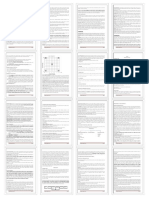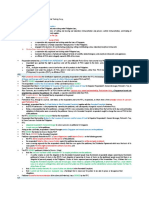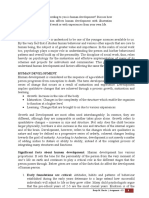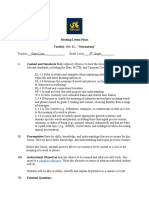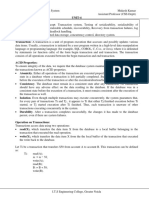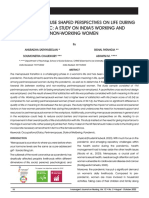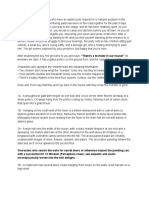NCM 119 - Trans
NCM 119 - Trans
Uploaded by
LADY DIWATA MACASAETCopyright:
Available Formats
NCM 119 - Trans
NCM 119 - Trans
Uploaded by
LADY DIWATA MACASAETOriginal Title
Copyright
Available Formats
Share this document
Did you find this document useful?
Is this content inappropriate?
Copyright:
Available Formats
NCM 119 - Trans
NCM 119 - Trans
Uploaded by
LADY DIWATA MACASAETCopyright:
Available Formats
BS NURSING
NCM 119 41
LECTURE / FIRST SEMESTER
Chapter 1
Trans by: Aclan, Adalia, Aligado, Anonuevo, Aquino, Balaoeg, Balatinsayo, Banez, and Belda 03
NURSING LEADERSHIP AND MANAGEMENT Risk-taking Maintain an Interested in risk-
orderly, taking and
LEADERSHIP VS. MANAGEMENT controlled, rational exploring new
and equitable ideas
Leadership: the act of influencing and motivating a group of structure
people to act in the same direction towards achieving a
common goal. Relationship According to their In an intuitive and
with people own roles emphatic manner
Management: the process of leading and directing an
organization to meet its goal through the use of appropriate
Self-reward When fulfilling From personal
resources.
organizational achievements
missions or goals
LEADERSHIP MANAGEMENT
Success as If they are May or may not be
manager reappointed; successful
do not have delegated legitimate source of power manager as long manager
authority but obtain their due to the delegated as appointment
power through other means, authority holds
such as influence
LEADERSHIP STYLE
focus on group process, emphasize control, decision
information gathering, making, decision analysis,
Autocratic/Authoritarian Leadership
feedback, and empowering and results
others ● Makes decision alone
● Task oriented
have goals that may or may greater formal responsibility ● Power with coercion
not reflect those of the and accountability for ● Proves useful (even necessary) in crisis situation
● Authoritarian or exploitative style of leadership
organization rationality and control than
● Satisfaction is low
leaders ● Effective when needed for immediate action
● High productivity, less satisfaction of workers
“...management is efficiency in climbing the ladder of Democratic Leadership
success; leadership determines whether the ladder is
leaning against the right wall.” Involve their followers in decision making
People oriented
MANAGERS LEADERS
Leads to increase productivity and job satisfaction
There is compliance
Appointment Are appointed May or may not Participative/Consultative
officially to have official
position appointment to Laissez-Faire Leadership
position
● Loose and permissive
● Ultraliberal
Power and Have power and As long as ● Foster freedom for everyone and wants everyone to
Authority authority to followers are willing be happy
enforce ● Results in low productivity and employee frustration
● Most beneficial to a staff of highly motivated
professionals
Goals Carry out Influence others,
predetermined either formally or
policies, rules and informally
regulations
BS NURSING
NCM 119 41
LECTURE / FIRST SEMESTER
Chapter 1
Trans by: Aclan, Adalia, Aligado, Anonuevo, Aquino, Balaoeg, Balatinsayo, Banez, and Belda 03
LEADERSHIP THEORIES DEVELOPMENT OF MANAGEMENT THEORIES
Management
Great Man Theory
● Assumes that some are born to be lead whereas
● It is the process of getting activities completed
efficiently and effectively with and through people
others are born to be led.
● They are born with the capacity to persuade, influence ● Is the process of planning, organizin, directing and
and motivate others. controlling human and physical resources
Trait Theory
7 BASIC RESOURCES OF MANAGEMENT
● Leader has innate abilities that should be develop for
him/ her to become a successful leader. ● Manpower
● Intelligent, initiative, creative and communication skills ● Money
● Machine
Situational Theory ● Materials
● Methods
● Hershey and Blanchard ~ ● Moment
● Emphasizes on the maturity level of the leader/ ● Market
member
● leadership effectiveness model
● participating and leadership style LEVELS OF MANAGER
Contigency Theory Upper level Managers
- Primary responsible for establishing organizational
● Fiedler goals and strategic plans for the entire division of
● leader can be effective if he/she can immediately nursing.
resolve an emergency or crisis situation. - Policy making body of the organization
● 3 aspects: leader member relation, task structure, and
position power Middle level Managers
- Usually coordinate nursing activities of several units
Transactional Theory
First level Managers
● leaders are called traditional leaders - Directly responsible for the actual production of
● Burns nursing services; acts as links between higher level
● Concerned with day to day operation managers and non-managers.
● Leaders rely on rewards and punishments to achieve
optimal job performance from their subordinates.
SCIENTIFIC MANAGEMENT
Transformational Theory
Frederick W. Taylor, the “father of scientific management”
Leader promises change by stimulating people to
change - Work should be studied scientifically to determine the
Focus on vision and empowerment method of task performance that would yield
Leader is commited
maximum work output with minimum work
Servant Theory expenditure.
Greenleaf Four Overriding Principles of Scientific Management
Put serving others including employees, customers
and community as the number one priority 1. Traditional “rule of thumb” means of organizing work
must be replaced with scientific methods.
2. A scientific personnel system must be established so
that workers can be hired, trained, and promoted
based on their technical competence and abilities.
BS NURSING
NCM 119 41
LECTURE / FIRST SEMESTER
Chapter 1
Trans by: Aclan, Adalia, Aligado, Anonuevo, Aquino, Balaoeg, Balatinsayo, Banez, and Belda 03
3. Workers should be able to view how they “fit into the 4. Unity of command: there should only be one boss
organization and how they contribute to overall with no conflicting lines of command.
organizational productivity. 5. Unity of direction: people engaged in the same kind
4. The relationship between managers and workers of activities must have the same objectives in a single
should be cooperative and interdependent, and the plan.
work should be shared equally. 6. Subordination of individual interest to general
interest: the goals of the firms are always paramount.
7. Remuneration: payment is an important motivator.
BUREAUCRACY 8. Centralization or Decentralization: depends on the
condition of business and the quality of its personnel.
Max Weber (1922): Theory of Social and Economic 9. Scalar chain/line of authority: refers to the number
Organization advocated Bureaucracy. of levels in the hierarchy.
10. Order: both material order (minimizes lost time &
- Need for legalized, formal authority and consistent useless handling of materials) and social order
rules and regulations for personnel in different (organization and selection) are necessary.
positions. 11. Equity: employees should be treated well to achieve
equity
12. Stability of tenure of personnel: job security and
MANAGEMENT FUNCTIONS career progress are important for employees to work
better.
Henri Fayol (1925): first identified the management functions 13. Initiative: allow personnel to show their initiative, it
of planning, oraginzation, command, coordination, and control. may be a source of strength for the organization.
14. Esprit de corps: management should foster the
Activities of Management moral of employees.
1. Planning determines philosophy, goals, objectives,
policies, procedures, and rules; carrying out long- and ACTIVITIES OF MANAGEMENT
short-range projections; determining a fiscal course of
action; and managing planned change. Luther Gulick (1937): Expanded on Fayol’s management
2. Organizing establishes the structure to carry out functions in his introduction of the “Seven Activities of
plans, determining the most appropriate type of Management”
patient care delivery, and grouping activities to meet
unit goals. Seven Activities of Management (POSDCORB)
3. Staffing consist of recruiting, interviewing, hiring, and
orienting staff. Scheduling, staff development, ● Planning
employee socialization, and team building. ● Organizing
4. Directing consists of motivating, managing conflict, ● Staffing
delegating, communicating, and facilitating ● Directing
collaboration. ● Coordinating
5. Controlling functions include performance ● Reporting
appraisals, fiscal accountability, quality control, legal ● Budgeting
and ethical control, and professional and collegial
control
HUMAN RELATIONS MANAGEMENT
14 Principles of Management
Mary Parker Follett(1926): was one of the first theorists to
1. Division of work: allows specialization. suggest participative decision making or participative
2. Authority: right to command balanced with management.
responsibility and accountability.
3. Discipline: employees will only obey orders if - Managers should have authority with, rather than
management play their part by providing good over, employees.
leadership.
BS NURSING
NCM 119 41
LECTURE / FIRST SEMESTER
Chapter 1
Trans by: Aclan, Adalia, Aligado, Anonuevo, Aquino, Balaoeg, Balatinsayo, Banez, and Belda 03
Elton Mayo and his Harvard Associates (1927-1932): look at William Ouchi, Theory Z, posited that involved workers are the
the relationship between lights illumination in the factory and key to increase productivity.
productivity.
Hawthorne Effect
- Indicated that people respond to the fact that they
are being studied, attempting to increase whatever behavior.
Chris Argyris (1964): managerial domination causes workers
to become discouraged and passive.
- If self-esteem and independence needs are not met,
employees will become discouraged and troublesome
or may leave the organization.
MOTIVATIONAL THEORIES
Douglas McGregor (1960): X and Theory Y, posited that
managerial attitudes about employees can be directly
correlated with employee satisfaction.
Theory X and Y
- Theory X Managers believe that their employees are
basically lazy, need constant supervision and
direction, and are indifferent to organizational needs.
- Theory Y Managers believe that their workers enjoy
their work, are self-motivated, and are willing to work
hard to meet personal and organizational goals.
‘Theory X’ ‘Theory Y’
management
staff
Theory X - authoritarian,
repressive style. Tight
control, no development.
Produces limited, depressed Theory Y - liberating
culture. and developmental.
Control, achievement
and continuous
improvement
staff achieved by enabling,
empowering and
giving responsibility.
management
You might also like
- NCM 119 Notes EndtermDocument11 pagesNCM 119 Notes EndtermDJ Evan Jules100% (1)
- NCM 119 Nursing Leadership ManagementDocument25 pagesNCM 119 Nursing Leadership ManagementPatricia LlanosNo ratings yet
- Transes NCM119 LMDocument5 pagesTranses NCM119 LMMariezen FernandoNo ratings yet
- Leadership 402 Cont.Document7 pagesLeadership 402 Cont.norlisa sambayonNo ratings yet
- Leadership TeamworkDocument28 pagesLeadership Teamworkmazenomar2100No ratings yet
- Leadership StyleDocument3 pagesLeadership Style2jj47hmh8bNo ratings yet
- LMR Lec Part 1Document18 pagesLMR Lec Part 1saint_ronald8No ratings yet
- LeadershipDocument8 pagesLeadershipChae Umbrian CasonaNo ratings yet
- Leadership and Management - FUNDADocument7 pagesLeadership and Management - FUNDADanielle TorresNo ratings yet
- LEADERSHIPDocument3 pagesLEADERSHIPjonny talacayNo ratings yet
- LeadershipDocument3 pagesLeadershipjonny talacayNo ratings yet
- Organizational leadershipDocument37 pagesOrganizational leadershipgenruales2021No ratings yet
- Leadership Styles Versus MotivationDocument11 pagesLeadership Styles Versus MotivationJoshua OrdinarioNo ratings yet
- Module 12 Ca2 LeadershipDocument33 pagesModule 12 Ca2 LeadershipJin De VeraNo ratings yet
- Leadership and ManagementDocument5 pagesLeadership and ManagementElizabella Henrietta TanaquilNo ratings yet
- IB Business - 2.3 Leadership and ManagementDocument22 pagesIB Business - 2.3 Leadership and ManagementadrianaNo ratings yet
- Organizational Change PracticeDocument11 pagesOrganizational Change PracticeRio AlbaricoNo ratings yet
- 20220729175037MOHAMED014Block 11 Summary LeadershipDocument29 pages20220729175037MOHAMED014Block 11 Summary Leadershipnicholas wijayaNo ratings yet
- Reviewer GROUP-1-ORGANIZATION-AND-MANAGEMENTDocument3 pagesReviewer GROUP-1-ORGANIZATION-AND-MANAGEMENTlyka deguzmanNo ratings yet
- Kini 10e c14 FinalDocument32 pagesKini 10e c14 Finalbasharswork99No ratings yet
- Leadership 1Document19 pagesLeadership 1Aditya Narayan DasNo ratings yet
- Leadership and Management 2ND LDocument19 pagesLeadership and Management 2ND LIvoNo ratings yet
- 5.mpob - LeadershipDocument21 pages5.mpob - LeadershipChaitanya PillalaNo ratings yet
- Unit08 Efective LeadershiphandoutDocument44 pagesUnit08 Efective Leadershiphandoutk62.2311790707No ratings yet
- Business Management Assignment Slide V1.1Document19 pagesBusiness Management Assignment Slide V1.1akhinesoeNo ratings yet
- RLE NCM119 Final ReviewerDocument9 pagesRLE NCM119 Final Reviewerjulia marie candelarioNo ratings yet
- Sales Leadership & SupervisionDocument24 pagesSales Leadership & SupervisionSZANo ratings yet
- UntitledDocument8 pagesUntitledAswini NalluriNo ratings yet
- Business PresentationDocument7 pagesBusiness PresentationbhusalshrizaNo ratings yet
- SLRC (Palmer)Document18 pagesSLRC (Palmer)Hafidah salicNo ratings yet
- Mats-Officedocument Wordprocessingml Documentrendition1Document8 pagesMats-Officedocument Wordprocessingml Documentrendition1Hafidah salicNo ratings yet
- MGT 1 Chapter 6Document27 pagesMGT 1 Chapter 6Lynx Fraunhofer AlignmentNo ratings yet
- Leadership and Operational ManagementDocument42 pagesLeadership and Operational ManagementDr Waheed AsgharNo ratings yet
- Chapter 6 ManagementDocument26 pagesChapter 6 ManagementSabra NadeemNo ratings yet
- LeadershipDocument20 pagesLeadershipsinghsahaab2005No ratings yet
- Leadership SkillsDocument106 pagesLeadership SkillsRaj KumarNo ratings yet
- KINI - 10e - C14 - Final STUDENTSDocument39 pagesKINI - 10e - C14 - Final STUDENTSCẩm Vân ĐNo ratings yet
- LEADERSHIPDocument40 pagesLEADERSHIPmacbook28487No ratings yet
- Fundamental of Organization BehaviorDocument56 pagesFundamental of Organization Behavioraayusharora516No ratings yet
- LeadershipDocument10 pagesLeadershipPuloma Singh RaghavNo ratings yet
- Leaders and ManagersDocument2 pagesLeaders and ManagersMatheus BayuNo ratings yet
- LAB MANAGEMENT LESSON 5Document3 pagesLAB MANAGEMENT LESSON 5Seulgi KangNo ratings yet
- LABMGMT Midterms 1stSemNotesDocument7 pagesLABMGMT Midterms 1stSemNotess2023100462No ratings yet
- Entrepreneurial Mind: Leadership in HealthcareDocument9 pagesEntrepreneurial Mind: Leadership in HealthcareMARVIE JOY BALUMA CABIOCNo ratings yet
- Leadership ManagementDocument3 pagesLeadership ManagementElla SugayNo ratings yet
- Leading 3 PDFDocument29 pagesLeading 3 PDFLeiden Jane Toledano100% (1)
- UntitledDocument30 pagesUntitledAswini NalluriNo ratings yet
- Leadership and Managment NotesDocument7 pagesLeadership and Managment Notespolina.peksheva.ppNo ratings yet
- Module 4 - Leadership-1Document23 pagesModule 4 - Leadership-1Sujith NNo ratings yet
- Nursing L e A D e R S H I PDocument19 pagesNursing L e A D e R S H I PJenrhi PonferradaNo ratings yet
- Character Formation 1– Leadership Decision Making Management and Administration HandoutDocument7 pagesCharacter Formation 1– Leadership Decision Making Management and Administration HandoutkpcreyesNo ratings yet
- Chapter Objectives: Directing Theories Motivation CommunicationDocument57 pagesChapter Objectives: Directing Theories Motivation CommunicationBiya KumilachewNo ratings yet
- Lesson 5 LeadershipDocument20 pagesLesson 5 LeadershipAngelica SA ReyesNo ratings yet
- 3 Essential Roles of Leaders: Leadership TheoryDocument3 pages3 Essential Roles of Leaders: Leadership TheoryAnjo Dela PeñaNo ratings yet
- Leadership - OverviewDocument15 pagesLeadership - Overviewosama.hassn1991No ratings yet
- Lesson 6 NCM 103Document5 pagesLesson 6 NCM 103KIM KALIBAYNo ratings yet
- NCM 119Document6 pagesNCM 11921-52497No ratings yet
- Ch03 - Leadership and ManagementDocument15 pagesCh03 - Leadership and ManagementTú Quyên Dương100% (1)
- Nursing Leadership and Management NotesDocument20 pagesNursing Leadership and Management NotesMikee Paningbatan100% (1)
- History of English Literature PDFDocument9 pagesHistory of English Literature PDFKebab Tvrtkić100% (1)
- Garcia vs. Comelec, GR 111230, September 30, 1994Document32 pagesGarcia vs. Comelec, GR 111230, September 30, 1994vj hernandezNo ratings yet
- Perkin Elmer Singapore Pte LTDDocument3 pagesPerkin Elmer Singapore Pte LTDDana Denisse RicaplazaNo ratings yet
- Ricafort V Medina A.C. No. 5179Document1 pageRicafort V Medina A.C. No. 5179Crystal Kate AgotNo ratings yet
- Quiz Bee SCIENCE 4 and 6Document8 pagesQuiz Bee SCIENCE 4 and 6YhangetNo ratings yet
- C3 AssignmentDocument9 pagesC3 Assignmentschacko77No ratings yet
- Factors Necessary For Appropriate Service StandardDocument2 pagesFactors Necessary For Appropriate Service StandardHarsha July100% (1)
- Baliwag Transit vs. CADocument2 pagesBaliwag Transit vs. CACaroline A. LegaspinoNo ratings yet
- Digital Technologies and Firm PerformanceDocument10 pagesDigital Technologies and Firm PerformancebthncengizNo ratings yet
- Yevamot 10Document70 pagesYevamot 10Julian Ungar-SargonNo ratings yet
- Preliminary Full KrisDocument59 pagesPreliminary Full KrisKris Antonnete DaleonNo ratings yet
- Hyperbole Lesson PlanDocument4 pagesHyperbole Lesson Planapi-651319805No ratings yet
- Wedding Vows - What Do They Really MeanDocument28 pagesWedding Vows - What Do They Really Meanpsykosomatik0% (1)
- For A History Project On Sarojini NaiduDocument12 pagesFor A History Project On Sarojini NaiduHarshit JainNo ratings yet
- Join Indian Army: Indian Army Directorate General of Recruiting JAI/RAJ/KOT/STT/2016/117035Document2 pagesJoin Indian Army: Indian Army Directorate General of Recruiting JAI/RAJ/KOT/STT/2016/117035vireNo ratings yet
- Your Amazing Body - Sólo Libro Sin EjerciciosDocument19 pagesYour Amazing Body - Sólo Libro Sin Ejerciciossamuel.rondonNo ratings yet
- DBMS Unit 4Document19 pagesDBMS Unit 4RajeshkumarSinghNo ratings yet
- Kata-Kata Hikmat Bahasa InggerisDocument2 pagesKata-Kata Hikmat Bahasa InggerisKiu Boon0% (1)
- CLASS 9 OlympiadDocument8 pagesCLASS 9 OlympiadTirthajit SinhaNo ratings yet
- Statprob Q4 Module 4Document19 pagesStatprob Q4 Module 4Kelsey Gaile MaghanoyNo ratings yet
- Mba BanarasDocument3 pagesMba BanarassareenaikbalNo ratings yet
- Picnic Cardigan Pattern QuynhDocument15 pagesPicnic Cardigan Pattern Quynhthanh.lehoahoc2020No ratings yet
- Korean Alphabet, Pronunciation and LanguageDocument7 pagesKorean Alphabet, Pronunciation and LanguageNhuQuynhDoNo ratings yet
- Data SiswaDocument202 pagesData SiswaDidit Dwi Jayanto MTs N 3 PaserNo ratings yet
- How Perimenopause Shaped Perspectives On Life During The Pandemic: A Study On India's Working and Non-Working WomenDocument12 pagesHow Perimenopause Shaped Perspectives On Life During The Pandemic: A Study On India's Working and Non-Working WomenBishal PatangiaNo ratings yet
- Theory of YieldingDocument10 pagesTheory of YieldingrasprasadNo ratings yet
- DM NOTES - Death HouseDocument11 pagesDM NOTES - Death Housegarrett kirkNo ratings yet
- NEGOtiable Instruments Class NotesDocument20 pagesNEGOtiable Instruments Class NotesCattleyaNo ratings yet
- Preston Corporation SDN BHD V Edward Leong & OrsDocument12 pagesPreston Corporation SDN BHD V Edward Leong & OrsJulie Anne100% (1)
- Introductory Editorial For ACS Infectious Diseases: Courtney Aldrich, Editor-in-ChiefDocument2 pagesIntroductory Editorial For ACS Infectious Diseases: Courtney Aldrich, Editor-in-ChiefAnonymous qI1friPJrNo ratings yet



























